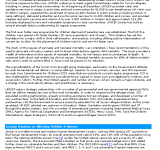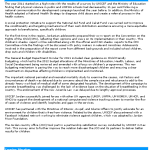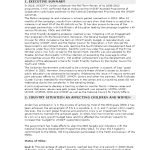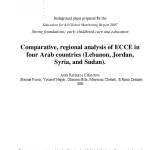ورعاية الأطفال
The 2011 annual report provides a comprehensive summary of the ongoing projects by the UNICEF Jordan Country Office (JCO). The programmes and projects include social protection initiatives for the National Aid Fund and Zakat Fund;; national perinatal and neonatal mortality study and development of nationwide computerized violence tracking system. . The analysis of the report is based on the progress and assessment of the JCO’s projects in partnership with other organizations in relevant fields including the Ministries of Interior;; Awqaf and Islamic Affairs and other UN agencies (UNDP;; UNFPA;; UNWOMEN;; UNHCR and WHO). The report specifies the organization’s methodology in collecting data and evidence and monitoring mechanisms to track and assess programme progress. In evaluating the development of ongoing projects;; the report summarizes future work plans and examines critical factors and constraints in each project.
The UNICEF Syria Crisis is a series of bi-weekly report that provides a summary of the humanitarian situation in Syria and development of the organization’s projects in the regions including Syria;; Lebanon;; Jordan;; Iraq;; Turkey and Egypt. The report contains an overview to the changing situations and humanitarian needs of the crisis. It focuses on the results and progress of the UNICEF projects in partnership with other local agencies in each country. These projects aim to ensure sustained access to safe water and sanitation;; provide psychosocial support;; vaccination and school supplies for children and support camps and host community schools for increased school enrollment. Relevant figures that summarize and evaluate the development of ongoing programmes can also be found in the report.
The annual report provides an overview to the country situation in regards to children and women and summary of the humanitarian and developmental assistance of the UNICEF Jordan Country Office (JCO) in 2010. The report includes Jordan’s progress in achieving the Millennium Development Goals in addition to the analysis of the organization’s projects. The projects focus on assisting Iraqi children in education and strengthening young child survival and development and adolescents’ participation and empowerment. The analysis of the report is based on the progress and assessment of the JCO’s projects in partnership with other UN agencies;; local agencies and government ministries. Some highlights of the 2010 annual report include the Ma’An campaign to end violence in school;; the UNICEF’s partnership with the government in supporting Iraqi children in gaining access to public education and a joint programme to develop a tracking system to monitor family violence and abuse cases with other UN agencies and Jordan’s National Council for Family Affairs.
This report provides an overview of the status of early childhood care and education (ECCE) in Jordan;; Lebanon;; Sudan;; and Syria. It examines the contextual factors influencing ECCE;; highlighting current policies;; challenges;; and strategies for improvement and expansion. The report underscores the paucity and limitations of available data. Findings show that ECCE services have improved but regional disparity and dominance of the private sector prevail. None of the four countries but Jordan has a full-fledged national strategy and policy on ECCE. Challenges identified include lack of qualified teachers;; societal misconceptions about the unique features of early childhood;; and lack of research-based studies. Innovative projects show that NGOs have been instrumental in addressing the needs of marginalized children.




